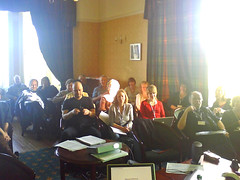Ross Priory, Scotland.
The last presentation here at ICE 3 is a group act by Bruce Ingraham, Gráinne Conole, Chris Jones, and George Roberts, who have also set up a group blog in preparation for this talk, which some of us have already contributed to. Their focus is especially on scholarly communication through new media environments - and they begin by noting that unfortunately few ICErs did respond to their original blog-based challenge, which in itself provides some insight on the extent to which scholarly discourses have changed so far. Why is this so - are the topics available too dull; is there too little time available to participate in such environments; or are emerging new media not suited to scholarly discourse (which could also mean that scholarly discourse is unsuited to the modern world, however). If we are not professing our disciplines to one another using such new media environments, however, how can we enocurage our students to do so? If we do not do so, then who will - the people formerly known as students?













